Ankle Osteoarthritis
Osteoarthritis (OA) is a condition that causes the cartilage that makes up your joints to deteriorate over time, making the bones rub against each other when you move. This causes pain, swelling, and a loss of function. Osteoarthritis often affects the ankle joints. There is no single known cause of osteoarthritis, but certain factors can increase your risk of developing the condition. Osteoarthritis is more common as we age, with older adults being at greater risk of developing OA. Being obese or overweight can put added strain on your ankle joints, and fat cells produce proteins that may make OA worse. Genetics can also play a role, as people with a family history of OA are more likely to have OA themselves. Injuries or repeated stress to the ankles, or having misaligned joints, can also raise your risk. If you are experiencing ankle pain and think that it may be OA, it is suggested that you seek the care of a podiatrist.
Arthritis can be a difficult condition to live with. If you are seeking treatment, contact Donald Manger, DPM from Associated Podiatric Physicians, PA. Our doctor can provide the care you need to keep you pain-free and on your feet.
Arthritic Foot Care
Arthritis is a joint disorder that involves the inflammation of different joints in your body, such as those in your feet. Arthritis is often caused by a degenerative joint disease and causes mild to severe pain in all affected areas. In addition to this, swelling and stiffness in the affected joints can also be a common symptom of arthritis.
In many cases, wearing ill-fitting shoes can worsen the effects and pain of arthritis. Wearing shoes that have a lower heel and extra room can help your feet feel more comfortable. In cases of rheumatoid arthritis, the arch in your foot may become problematic. Buying shoes with proper arch support that contour to your feet can help immensely.
Alleviating Arthritic Pain
- Exercises that stretch the foot can prevent further pain and injury and increase mobility
- Most of the pain can be alleviated with anti-inflammatory drugs, heat, and topical medications
- Massages can help temporarily alleviate pain.
It is best to see your doctor for the treatment that is right for your needs and symptoms. Conditions vary, and a podiatrist can help you determine the right method of care for your feet.
If you have any questions, please feel free to contact our office located in Hamilton Township, NJ . We offer the newest diagnostic tools and technology to treat your foot and ankle needs.
What Can I Do to Prevent Falling?
 As we age, the risk of falling increases. Falls are the leading cause of injuries in adults over the age of 65 in the United States. Fortunately, there are measures that you can take to help keep you on your feet. It is important to maintain a healthy lifestyle, and this includes exercising regularly. Strength and resistance training, improving your balance, and walking are all great forms of lighter exercise that can keep you fit, and therefore less likely to fall. Modifying the living environment to reduce tripping hazards can also lower your risk of falling, as most falls happen in the home. Wearing the right shoes will give your feet the support you need while going about your daily activities. It is also important to see your doctors for regular checkups. For more information about preventing falls, consult with a podiatrist today.
As we age, the risk of falling increases. Falls are the leading cause of injuries in adults over the age of 65 in the United States. Fortunately, there are measures that you can take to help keep you on your feet. It is important to maintain a healthy lifestyle, and this includes exercising regularly. Strength and resistance training, improving your balance, and walking are all great forms of lighter exercise that can keep you fit, and therefore less likely to fall. Modifying the living environment to reduce tripping hazards can also lower your risk of falling, as most falls happen in the home. Wearing the right shoes will give your feet the support you need while going about your daily activities. It is also important to see your doctors for regular checkups. For more information about preventing falls, consult with a podiatrist today.
Preventing falls among the elderly is very important. If you are older and have fallen or fear that you are prone to falling, consult with Donald Manger, DPM from Associated Podiatric Physicians, PA. Our doctor will assess your condition and provide you with quality advice and care.
Every 11 seconds, an elderly American is being treated in an emergency room for a fall related injury. Falls are the leading cause of head and hip injuries for those 65 and older. Due to decreases in strength, balance, senses, and lack of awareness, elderly persons are very susceptible to falling. Thankfully, there are a number of things older persons can do to prevent falls.
How to Prevent Falls
Some effective methods that older persons can do to prevent falls include:
- Enrolling in strength and balance exercise program to increase balance and strength
- Periodically having your sight and hearing checked
- Discuss any medications you have with a doctor to see if it increases the risk of falling
- Clearing the house of falling hazards and installing devices like grab bars and railings
- Utilizing a walker or cane
- Wearing shoes that provide good support and cushioning
- Talking to family members about falling and increasing awareness
Falling can be a traumatic and embarrassing experience for elderly persons; this can make them less willing to leave the house, and less willing to talk to someone about their fears of falling. Doing such things, however, will increase the likelihood of tripping or losing one’s balance. Knowing the causes of falling and how to prevent them is the best way to mitigate the risk of serious injury.
If you have any questions, please feel free to contact our office located in Hamilton Township, NJ . We offer the newest diagnostic and treatment technologies for all your foot care needs.
What Are the Causes of Ingrown Toenails?
 The medical condition that is referred to as an ingrown toenail can be accompanied by redness, swelling, and pain. It is an ailment that often affects the big toe, and occurs when the nail grows into the outer edge of the skin. Common reasons why this condition can occur include wearing shoes that do not have adequate room for the toes to move freely in or from a toe injury. Additionally, repeated activities that involve kicking a ball may cause ingrown toenails to develop. Relief may be found when the affected toe is soaked in warm water, followed by placing a small piece of cotton between the nail and the skin. If your ingrown toenail has become infected, it is strongly recommended that you seek the counsel of a podiatrist who can properly treat this condition.
The medical condition that is referred to as an ingrown toenail can be accompanied by redness, swelling, and pain. It is an ailment that often affects the big toe, and occurs when the nail grows into the outer edge of the skin. Common reasons why this condition can occur include wearing shoes that do not have adequate room for the toes to move freely in or from a toe injury. Additionally, repeated activities that involve kicking a ball may cause ingrown toenails to develop. Relief may be found when the affected toe is soaked in warm water, followed by placing a small piece of cotton between the nail and the skin. If your ingrown toenail has become infected, it is strongly recommended that you seek the counsel of a podiatrist who can properly treat this condition.
Ingrown toenails may initially present themselves as a minor discomfort, but they may progress into an infection in the skin without proper treatment. For more information about ingrown toenails, contact Donald Manger, DPM of Associated Podiatric Physicians, PA. Our doctor can provide the care you need to keep you pain-free and on your feet.
Ingrown Toenails
Ingrown toenails are caused when the corner or side of a toenail grows into the soft flesh surrounding it. They often result in redness, swelling, pain, and in some cases, infection. This condition typically affects the big toe and may recur if it is not treated properly.
Causes
- Improper toenail trimming
- Genetics
- Improper shoe fitting
- Injury from pedicures or nail picking
- Abnormal gait
- Poor hygiene
You are more likely to develop an ingrown toenail if you are obese, have diabetes, arthritis, or have any fungal infection in your nails. Additionally, people who have foot or toe deformities are at a higher risk of developing an ingrown toenail.
Symptoms
Some symptoms of ingrown toenails are redness, swelling, and pain. In rare cases, there may be a yellowish drainage coming from the nail.
Treatment
Ignoring an ingrown toenail can have serious complications. Infections of the nail border can progress to a deeper soft-tissue infection, which can then turn into a bone infection. You should always speak with your podiatrist if you suspect you have an ingrown toenail, especially if you have diabetes or poor circulation.
If you have any questions, please feel free to contact our office located in Hamilton Township, NJ . We offer the newest diagnostic and treatment technologies for all your foot care needs.
How Do I Find the Right Size Shoe?
When you shop for new shoes, it can be difficult to find the right size. Manufacturers often don’t follow a standard sizing system for their shoes, so your shoe size might differ between brands or even between different styles of shoes within the same brand! To find the right shoe, use the size as a guideline rather than a strict rule. What you might really want to pay attention to are the width of the shoe, the materials that the shoes are made of, how you are planning to use the shoes, and any foot health issues that you may have. Shopping for shoes in person may be more effective than shopping online, as a salesperson will be able to assist you when you are in the store. For more information about how to find the right shoes for you, it is recommended that you consult with a podiatrist.
Getting the right shoe size is an important part of proper foot health. Seek the assistance of Donald Manger, DPM from Associated Podiatric Physicians, PA. Our doctor will provide the care you need to keep you pain-free and on your feet.
Getting the Right Shoe Size
There are many people who wear shoes that are the incorrect size, negatively affecting their feet and posture. Selecting the right shoes is not a difficult process, so long as you keep several things in mind when it comes to choosing the right pair.
- When visiting the shoe store, use the tools available to measure your foot.
- Be sure there is ‘wiggle room’. There should be about an inch between your toes and the tip of your shoes.
- Do not always assume you are the same size, as manufacturers run differently.
- Purchase shoes later in the day, as your feet swell as the day progresses.
- If a shoe is not comfortable, it is not suitable. Most shoes can’t be ‘broken in’, and comfort should be the ultimate goal when it comes to choosing the right pair of shoes
As our feet hold our body weight and keep us moving, it is important to treat them right. Picking the right pair of shoes can provide your feet comfort and mobility without pain.
If you have any questions, please feel free to contact our office located in Hamilton Township, NJ . We offer the newest diagnostic and treatment technologies for all your foot care needs.
Causes of Peripheral Neuropathy
Peripheral neuropathy is a disorder characterized by damage to the nerves outside of the brain and spinal cord. This condition often affects the nerves of the lower limbs, leading to symptoms such as weakness, numbness, pain, and reduced sensation. This disorder has many possible causes. One of the most common is diabetes, however, peripheral neuropathy can also be caused by shingles, a vitamin deficiency, excessive alcohol use, certain autoimmune diseases, AIDS, various inherited disorders, exposure to certain toxins, and cancer therapy drugs. If you have peripheral neuropathy, it is important to keep an eye on your foot health. A podiatrist can help you manage your peripheral neuropathy.
Neuropathy
Neuropathy can be a potentially serious condition, especially if it is left undiagnosed. If you have any concerns that you may be experiencing nerve loss in your feet, consult with Donald Manger, DPM from Associated Podiatric Physicians, PA. Our doctor will assess your condition and provide you with quality foot and ankle treatment for neuropathy.
What Is Neuropathy?
Neuropathy is a condition that leads to damage to the nerves in the body. Peripheral neuropathy, or neuropathy that affects your peripheral nervous system, usually occurs in the feet. Neuropathy can be triggered by a number of different causes. Such causes include diabetes, infections, cancers, disorders, and toxic substances.
Symptoms of Neuropathy Include:
- Numbness
- Sensation loss
- Prickling and tingling sensations
- Throbbing, freezing, burning pains
- Muscle weakness
Those with diabetes are at serious risk due to being unable to feel an ulcer on their feet. Diabetics usually also suffer from poor blood circulation. This can lead to the wound not healing, infections occurring, and the limb may have to be amputated.
Treatment
To treat neuropathy in the foot, podiatrists will first diagnose the cause of the neuropathy. Figuring out the underlying cause of the neuropathy will allow the podiatrist to prescribe the best treatment, whether it be caused by diabetes, toxic substance exposure, infection, etc. If the nerve has not died, then it’s possible that sensation may be able to return to the foot.
Pain medication may be issued for pain. Electrical nerve stimulation can be used to stimulate nerves. If the neuropathy is caused from pressure on the nerves, then surgery may be necessary.
If you have any questions, please feel free to contact our office located in Hamilton Township, NJ . We offer the newest diagnostic and treatment technologies for all your foot care needs.
Guidelines for Purchasing New Shoes for Your Child
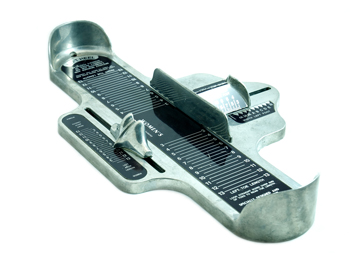 When purchasing new shoes for your children, there are general guidelines to follow that can help to ensure a proper fit. These can include shopping for shoes with your child present and wearing the socks that they intend to wear with their new shoes. It is important for the shoes to be roomy in both length and width, and that there is adequate support and cushioning. The heel should be rigid for maximum support, and although synthetic materials may be cheaper, it is better to go with quality materials such as leather or rubber. Additionally, it is beneficial to measure your child's feet before purchasing shoes. This can be accurately accomplished when a Brannock device is used. Shoes that fit properly for kids will feel comfortable when they are new, and they should not have to be broken in. It is important to make sure that there is ample room for the toes to move freely, as this may help to prevent painful foot conditions from developing. If you would like more information about purchasing shoes that fit correctly for your children, please consult with a podiatrist.
When purchasing new shoes for your children, there are general guidelines to follow that can help to ensure a proper fit. These can include shopping for shoes with your child present and wearing the socks that they intend to wear with their new shoes. It is important for the shoes to be roomy in both length and width, and that there is adequate support and cushioning. The heel should be rigid for maximum support, and although synthetic materials may be cheaper, it is better to go with quality materials such as leather or rubber. Additionally, it is beneficial to measure your child's feet before purchasing shoes. This can be accurately accomplished when a Brannock device is used. Shoes that fit properly for kids will feel comfortable when they are new, and they should not have to be broken in. It is important to make sure that there is ample room for the toes to move freely, as this may help to prevent painful foot conditions from developing. If you would like more information about purchasing shoes that fit correctly for your children, please consult with a podiatrist.
Finding a properly-fitting shoe is important in reducing injuries and preventing foot problems. For more information about treatment, contact Donald Manger, DPM from Associated Podiatric Physicians, PA. Our doctor will treat your foot and ankle needs.
Proper Shoe Fitting
A common concern when it comes to foot health, having properly fitted shoes can help prevent injuries to the foot. Out feet affect our posture and gait, which in turn affects the biomechanics and overall bodily structure. With 33 joints, 26 bones, and over 100 ligaments, the potential for serious injury is much greater than one realizes. Although the feet cease growth in adulthood, they still change shape as they mature. Here are some factors to consider when it comes to investing in proper fitting shoes:
- Be sure the shoes fit correctly right away
- Ensure the ball of your foot fits comfortably in the widest portion of the shoes
- Even though they may look fashionable, improper fitting shoes can either create adverse conditions or exacerbate existing ones you may already have
- Walk along a carpeted surface to ensure the shoes comfortably fit during normal activity
Keeping in mind how shoes fit the biomechanics of your body, properly-fitting shoes are vitally important. Fortunately, it is not difficult to acquire footwear that fits correctly. Be sure to wear shoes that support the overall structure of your body. Do your feet a favor and invest in several pairs of well-fitted shoes today.
If you have any questions please feel free to contact our office located in Hamilton Township, NJ . We offer the newest diagnostic and treatment technologies for all your foot and ankle needs.
Types of Foot Pain and Their Potential Causes
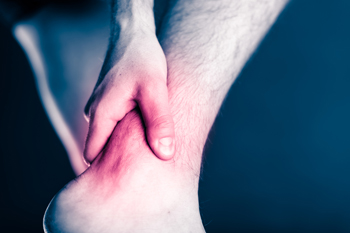 Foot and ankle pain is fairly common and can have a large variety of causes. Different parts of your feet, toes, or ankles may be affected. Skin problems of the feet include plantar warts, corns, calluses, blisters, athlete’s foot, ingrown toenails, and skin infections. Examples of conditions that can affect the joints of the feet and ankles include gout, bunions, hammertoes, and arthritis. Foot and ankle pain may be caused by plantar fasciitis, Achilles tendinitis, stress fractures or other injuries, heel spurs, and flat feet. If you experience numbness or tingling in your lower extremities, this may be due to Morton’s neuroma, sciatica, tarsal tunnel syndrome, diabetes, or peripheral artery disease. To figure out what is causing your foot and ankle pain, it is important to consult with a podiatrist. Providing the podiatrist with a thorough description of the location and type of pain that you are feeling is the first step to recovery.
Foot and ankle pain is fairly common and can have a large variety of causes. Different parts of your feet, toes, or ankles may be affected. Skin problems of the feet include plantar warts, corns, calluses, blisters, athlete’s foot, ingrown toenails, and skin infections. Examples of conditions that can affect the joints of the feet and ankles include gout, bunions, hammertoes, and arthritis. Foot and ankle pain may be caused by plantar fasciitis, Achilles tendinitis, stress fractures or other injuries, heel spurs, and flat feet. If you experience numbness or tingling in your lower extremities, this may be due to Morton’s neuroma, sciatica, tarsal tunnel syndrome, diabetes, or peripheral artery disease. To figure out what is causing your foot and ankle pain, it is important to consult with a podiatrist. Providing the podiatrist with a thorough description of the location and type of pain that you are feeling is the first step to recovery.
Foot Pain
Foot pain can be extremely painful and debilitating. If you have a foot pain, consult with Donald Manger, DPM from Associated Podiatric Physicians, PA. Our doctor will assess your condition and provide you with quality foot and ankle treatment.
Causes
Foot pain is a very broad condition that could be caused by one or more ailments. The most common include:
- Bunions
- Hammertoes
- Plantar Fasciitis
- Bone Spurs
- Corns
- Tarsal Tunnel Syndrome
- Ingrown Toenails
- Arthritis (such as Gout, Rheumatoid, and Osteoarthritis)
- Flat Feet
- Injury (from stress fractures, broken toe, foot, ankle, Achilles tendon ruptures, and sprains)
- And more
Diagnosis
To figure out the cause of foot pain, podiatrists utilize several different methods. This can range from simple visual inspections and sensation tests to X-rays and MRI scans. Prior medical history, family medical history, and any recent physical traumatic events will all be taken into consideration for a proper diagnosis.
Treatment
Treatment depends upon the cause of the foot pain. Whether it is resting, staying off the foot, or having surgery; podiatrists have a number of treatment options available for foot pain.
If you have any questions, please feel free to contact our office located in Hamilton Township, NJ . We offer the newest diagnostic and treatment technologies for all your foot care needs.
Where Are Plantar Warts Located?
 Plantar warts are those that are found on the bottom of the feet. Warts are caused by a virus that is known as the human papillomavirus (HPV). This virus can enter the body through a tiny break in the skin, and generally affects the top layer of skin. Plantar warts grow inward on the soles of the feet. This is a result of standing and walking for the majority of the day. A plantar wart appears as a small patch of hardened skin, and often has small, black dots in the center. These types of warts can cause severe pain and discomfort, and it is beneficial to quickly begin treatment. This can consist of applying salicylic acid to the wart, or possibly freezing it. If you have a plantar’s wart, it is suggested that you consult with a podiatrist who can determine what the best form of treatment is for you.
Plantar warts are those that are found on the bottom of the feet. Warts are caused by a virus that is known as the human papillomavirus (HPV). This virus can enter the body through a tiny break in the skin, and generally affects the top layer of skin. Plantar warts grow inward on the soles of the feet. This is a result of standing and walking for the majority of the day. A plantar wart appears as a small patch of hardened skin, and often has small, black dots in the center. These types of warts can cause severe pain and discomfort, and it is beneficial to quickly begin treatment. This can consist of applying salicylic acid to the wart, or possibly freezing it. If you have a plantar’s wart, it is suggested that you consult with a podiatrist who can determine what the best form of treatment is for you.
Plantar warts can be very uncomfortable. If you need your feet checked, contact Donald Manger, DPM from Associated Podiatric Physicians, PA. Our doctor will assist you with all of your foot and ankle needs.
About Plantar Warts
Plantar warts are the result of HPV, or human papillomavirus, getting into open wounds on the feet. They are mostly found on the heels or balls of the feet.
While plantar warts are generally harmless, those experiencing excessive pain or those suffering from diabetes or a compromised immune system require immediate medical care. Plantar warts are easily diagnosed, usually through scraping off a bit of rough skin or by getting a biopsy.
Symptoms
- Lesions on the bottom of your feet, usually rough and grainy
- Hard or thick callused spots
- Wart seeds, which are small clotted blood vessels that look like little black spots
- Pain, discomfort, or tenderness of your feet when walking or standing
Treatment
- Freezing
- Electric tool removal
- Laser Treatment
- Topical Creams (prescription only)
- Over-the-counter medications
To help prevent developing plantar warts, avoid walking barefoot over abrasive surfaces that can cause cuts or wounds for HPV to get into. Avoiding direct contact with other warts, as well as not picking or rubbing existing warts, can help prevent the further spread of plantar warts. However, if you think you have developed plantar warts, speak to your podiatrist. He or she can diagnose the warts on your feet and recommend the appropriate treatment options.
If you have any questions please feel free to contact our office located in Hamilton Township, NJ . We offer the newest diagnostic and treatment technologies for all your foot and ankle needs.
More...
What’s Causing My Lateral Foot Pain?
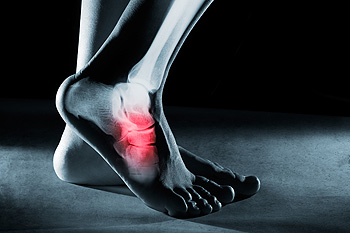 Pain felt on the outer side of the foot, or lateral foot pain, is often indicative of the condition known as cuboid syndrome. Trauma to the foot, or gradual repetitive force can cause the cuboid bone to shift out of place. Along with lateral foot pain, common symptoms of cuboid syndrome may include tenderness and swelling, difficulty walking, and pain that can worsen over time when weight is placed on the affected foot. Athletes such as ballet dancers and runners have been known to be affected by cuboid syndrome, as their particular physical activities can put strain on the cuboid bone. For a proper diagnosis, please seek the care of a podiatrist.
Pain felt on the outer side of the foot, or lateral foot pain, is often indicative of the condition known as cuboid syndrome. Trauma to the foot, or gradual repetitive force can cause the cuboid bone to shift out of place. Along with lateral foot pain, common symptoms of cuboid syndrome may include tenderness and swelling, difficulty walking, and pain that can worsen over time when weight is placed on the affected foot. Athletes such as ballet dancers and runners have been known to be affected by cuboid syndrome, as their particular physical activities can put strain on the cuboid bone. For a proper diagnosis, please seek the care of a podiatrist.
Cuboid syndrome, also known as cuboid subluxation, occurs when the joints and ligaments near the cuboid bone in the foot become torn. If you have cuboid syndrome, consult with Donald Manger, DPM from Associated Podiatric Physicians, PA. Our doctor will assess your condition and provide you with quality foot and ankle treatment.
Cuboid syndrome is a common cause of lateral foot pain, which is pain on the outside of the foot. The condition may happen suddenly due to an ankle sprain, or it may develop slowly overtime from repetitive tension through the bone and surrounding structures.
Causes
The most common causes of cuboid syndrome include:
- Injury – The most common cause of this ailment is an ankle sprain.
- Repetitive Strain – Tension placed through the peroneus longus muscle from repetitive activities such as jumping and running may cause excessive traction on the bone causing it to sublux.
- Altered Foot Biomechanics – Most people suffering from cuboid subluxation have flat feet.
Symptoms
A common symptom of cuboid syndrome is pain along the outside of the foot which can be felt in the ankle and toes. This pain may create walking difficulties and may cause those with the condition to walk with a limp.
Diagnosis
Diagnosis of cuboid syndrome is often difficult, and it is often misdiagnosed. X-rays, MRIs and CT scans often fail to properly show the cuboid subluxation. Although there isn’t a specific test used to diagnose cuboid syndrome, your podiatrist will usually check if pain is felt while pressing firmly on the cuboid bone of your foot.
Treatment
Just as the range of causes varies widely, so do treatments. Some more common treatments are ice therapy, rest, exercise, taping, and orthotics.
If you have any questions, please feel free to contact our office located in Hamilton Township, NJ . We offer the newest diagnostic and treatment technologies for all your foot care needs.
The Importance of Visiting a Podiatrist
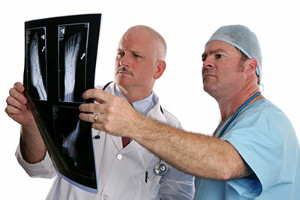 Due to potential underlying medical conditions like diabetes and arthritis, it is important to consult a podiatrist when experiencing issues with the feet. A podiatrist will not only be able to diagnose and treat the potential injury, but they are also able to help find a long term solution to the issue. Some issues that podiatrists help treat include, but are not limited to, sprains, ingrown toenails, bunions, blisters, flat feet, fungal nail infections and arthritis. Podiatrists are also able to help diagnose and treat more serious issues such as heel pain, which can sometimes be severe and limiting. If you are experiencing an issue with your feet, it is important to consult with a podiatrist about what treatment options are best for you.
Due to potential underlying medical conditions like diabetes and arthritis, it is important to consult a podiatrist when experiencing issues with the feet. A podiatrist will not only be able to diagnose and treat the potential injury, but they are also able to help find a long term solution to the issue. Some issues that podiatrists help treat include, but are not limited to, sprains, ingrown toenails, bunions, blisters, flat feet, fungal nail infections and arthritis. Podiatrists are also able to help diagnose and treat more serious issues such as heel pain, which can sometimes be severe and limiting. If you are experiencing an issue with your feet, it is important to consult with a podiatrist about what treatment options are best for you.
If you are experiencing pain in the feet or ankles, don’t join the stubborn majority refusing treatment. Feel free to contact Donald Manger, DPM from Associated Podiatric Physicians, PA. Our doctor can provide the care you need to keep you pain-free and on your feet.
What Is a Podiatrist?
Someone would seek the care of a podiatrist if they have suffered a foot injury or have common foot ailments such as heal spurs, bunions, arch problems, deformities, ingrown toenails, corns, foot and ankle problems, etc.
Podiatric Treatment
A podiatrist will treat the problematic areas of the feet, ankle or lower leg by prescribing the following:
- Physical therapy
- Drugs
- Orthotic inserts or soles
- Surgery on lower extremity fractures
A common podiatric procedure a podiatrist will use is a scanner or force plate which will allow the podiatrist to know the designs of orthotics. Patients are then told to follow a series of tasks to complete the treatment. The computer will scan the foot a see which areas show weight distribution and pressure points. The podiatrist will read the analysis and then determine which treatment plans are available.
If you have any questions please feel free to contact our office located in Hamilton Township, NJ . We offer the newest diagnostic and treatment technologies for all your foot and ankle needs.
Treatments for Bunions
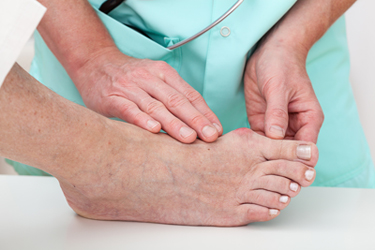 Bunions are bony bumps located on the joints at the base of the big toe. These bumps can cause symptoms such as foot pain, stiffness, swelling, skin irritation, or thickened skin over the joint. There are many different treatments for bunions. Conservative treatments, while not a cure for bunions, can relieve pain and slow or stop their progression. Because they are often caused by ill-fitting shoes, changing your footwear to shoes with a wider toe box and low heels can help relieve bunion pain by putting less pressure on your foot. Using a pad or orthotic insert in your shoes can provide the cushioning and support your feet need. Wearing a toe splint at night can help hold the big toe in a straighter position. Using an ice pack on the swollen joint may decrease swelling and pain. Some bunions are severe and cause so much pain and discomfort that they interfere with daily activities. Severe bunions often require surgery. If you have bunions, it is recommended that you seek the care of a podiatrist.
Bunions are bony bumps located on the joints at the base of the big toe. These bumps can cause symptoms such as foot pain, stiffness, swelling, skin irritation, or thickened skin over the joint. There are many different treatments for bunions. Conservative treatments, while not a cure for bunions, can relieve pain and slow or stop their progression. Because they are often caused by ill-fitting shoes, changing your footwear to shoes with a wider toe box and low heels can help relieve bunion pain by putting less pressure on your foot. Using a pad or orthotic insert in your shoes can provide the cushioning and support your feet need. Wearing a toe splint at night can help hold the big toe in a straighter position. Using an ice pack on the swollen joint may decrease swelling and pain. Some bunions are severe and cause so much pain and discomfort that they interfere with daily activities. Severe bunions often require surgery. If you have bunions, it is recommended that you seek the care of a podiatrist.
If you are suffering from bunions, contact Donald Manger, DPM of Associated Podiatric Physicians, PA. Our doctor can provide the care you need to keep you pain-free and on your feet.
What Is a Bunion?
A bunion is formed of swollen tissue or an enlargement of boney growth, usually located at the base joint of the toe that connects to the foot. The swelling occurs due to the bones in the big toe shifting inward, which impacts the other toes of the foot. This causes the area around the base of the big toe to become inflamed and painful.
Why Do Bunions Form?
Genetics – Susceptibility to bunions are often hereditary
Stress on the feet – Poorly fitted and uncomfortable footwear that places stress on feet, such as heels, can worsen existing bunions
How Are Bunions Diagnosed?
Doctors often perform two tests – blood tests and x-rays – when trying to diagnose bunions, especially in the early stages of development. Blood tests help determine if the foot pain is being caused by something else, such as arthritis, while x-rays provide a clear picture of your bone structure to your doctor.
How Are Bunions Treated?
- Refrain from wearing heels or similar shoes that cause discomfort
- Select wider shoes that can provide more comfort and reduce pain
- Anti-inflammatory and pain management drugs
- Orthotics or foot inserts
- Surgery
If you have any questions, please feel free to contact our office located in Hamilton Township, NJ . We offer the newest diagnostic and treatment technologies for all your foot care needs.






